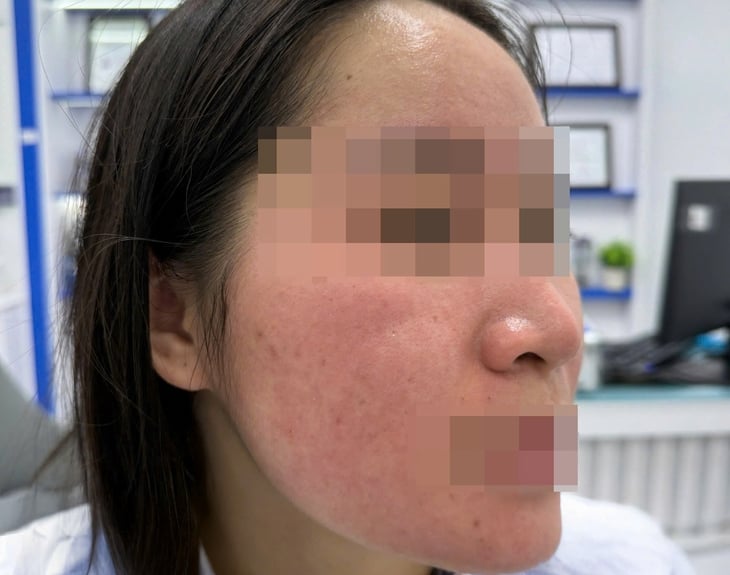
Girl's face swollen after using lemon juice to treat acne - Photo: BSCC
Red, swollen face, burning from treating acne with lemon juice
NKĐ. (25 years old, in Hanoi ) has oily skin, often having acne on the forehead and chin. While surfing social networks, she came across an article sharing the experience of "treating acne without spending a lot of money" by applying fresh lemon juice directly to the acne every night.
Thinking that lemon is a natural ingredient and that many people in the group supported it, D. tried it. Every day, she squeezed a little lemon and used a cotton swab to dab it on her pimples. At first, she felt a slight burning sensation but believed that it was a sign that it was working.
However, after 5 days, her face began to develop red patches, a burning sensation and a slight burning sensation, especially on her cheeks and chin. After 1 week, the red patches spread, her skin began to peel, swell and ache, making her worried and deciding to go to a dermatologist.
Directly examining the patient, Dr. Nguyen Tien Thanh - member of the Vietnam Dermatology Association - determined that this was a case of irritant dermatitis caused by contact with citric acid in lemon juice.
"Lemon is highly acidic. When applied directly to the skin, especially damaged skin such as acne, it can cause mild burns, irritation, and break down the skin's protective barrier. The condition will worsen if the patient is exposed to sunlight without using sunscreen," Dr. Thanh analyzed.
In addition, repeated daily use does not give the damaged skin time to recover, causing inflammation, prolonged pain, and the risk of post-inflammatory hyperpigmentation (PIH).
The patient was prescribed mild anti-inflammatory topical medications, skin recovery creams, avoiding exposure to sunlight and completely stopping all cosmetics. After 5 days of treatment, D.'s skin condition began to improve.
Why should lemon not be used on the face?
According to Dr. Thanh, there are several reasons why lemon juice, which seems "benign", is actually very dangerous when applied directly to the skin:
Because lemon juice contains concentrated citric acid, it will irritate, break down the skin's protective barrier, and unbalance the pH. Lemon makes the skin more sensitive to sunlight, which can cause photodermatitis.
"Lemon juice is also not suitable for acne-prone or sensitive skin. Damaged skin areas will become worse when exposed to acid. Using natural remedies cannot determine a safe concentration like medically tested products," said Dr. Thanh.
According to this expert, all skin conditions, especially inflammatory acne, should be properly treated by a dermatologist. Folk remedies should only be applied if they are clearly verified and have a reliable source.
Source: https://tuoitre.vn/het-tri-bach-benh-lai-ruoc-hoa-vi-dung-nuoc-cot-chanh-tri-mun-20250507085521441.htm



































































































Comment (0)